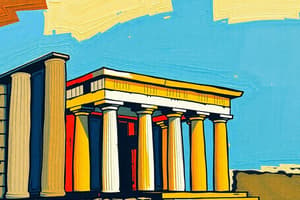Podcast
Questions and Answers
What was the status of women in ancient Greece?
What was the status of women in ancient Greece?
What was the gathering place for free citizens to debate and make decisions in ancient Greece?
What was the gathering place for free citizens to debate and make decisions in ancient Greece?
What was the name of the most powerful god in ancient Greek mythology?
What was the name of the most powerful god in ancient Greek mythology?
What was the name of the event that was similar to the modern-day Olympic Games in ancient Greece?
What was the name of the event that was similar to the modern-day Olympic Games in ancient Greece?
What was the geographical location of ancient Greece?
What was the geographical location of ancient Greece?
What was the name of the philosopher who valued intelligence and knowledge in ancient Greece?
What was the name of the philosopher who valued intelligence and knowledge in ancient Greece?
Flashcards are hidden until you start studying
Study Notes
- Ancient Greece existed from 1200 BC to 146 BC in Southeastern Europe, near the Mediterranean Sea and the Aegean Sea.
- The civilization was composed of city-states, known as poleis, with the most powerful being Sparta and Athens, each governing itself and being independent of the others.
- In ancient Greece, only men born in the polis were considered free citizens, with women, slaves, and foreigners excluded from this status.
- Free citizens would debate and make decisions on laws and norms in the Agora, a public plaza, through a voting system, which is why ancient Greeks are credited with inventing democracy.
- Ancient Greece was the birthplace of philosophy, with famous philosophers such as Socrates, Plato, and Aristotle, who valued intelligence and knowledge.
- The Greeks created the first intellectual civilization, dominating the Mediterranean for centuries.
- They developed theater and sports competitions, including the Olympics, which were similar to the modern-day event.
- Ancient Greeks were polytheists, believing in multiple gods, with Zeus being the most powerful, and their mythology is filled with stories and legends of heroes, gods, and strange creatures.
- The ancient Greeks created many concepts that are still used today, including democracy, politics, philosophy, theater, and the Olympics.
Studying That Suits You
Use AI to generate personalized quizzes and flashcards to suit your learning preferences.




